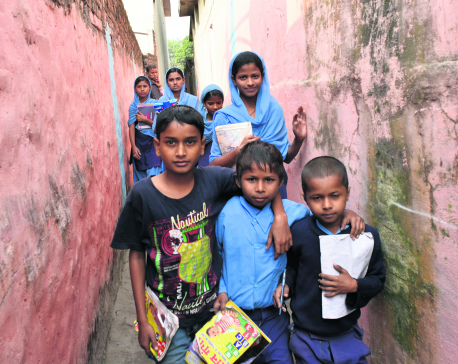
OR
Stay order against forced admission of children in community schools
Published On: May 24, 2018 08:10 AM NPT By: Republica | @RepublicaNepal
KATHMANDU, May 24: The Supreme Court (SC) on Wednesday issued a stay order against the compulsory admission of public office holders' children in community schools.
A division bench of justices Hari Krishna Karki and Sapana Pradhan Malla issued the order.
Chapakot Municipality of Syangja District had introduced the compulsory provision for admitting the children of public service holders to community schools for the first time.
However, the decision was challenged at the apex court by a local, Dilliraj Acharya, claiming that the decision violated the right to quality education of children of those government staffers.
The municipality, some few weeks ago, had issued a mandatory notice to government staff and teachers to admit their children to community schools to ensure the public's trust towards the such schools. The municipality also warned the public office holders and the teachers of depriving various facilities and allowances if they did not admit their children to community schools.
The apex court termed the decision of the municipality against the right to education ensured by the Constitution of Nepal and Child Right Act, 1992. The bench stated that the guardians have to guarantee proper personal and educational development of their children and that they have the right to select the school of their choice on the basis of the quality of education.
Henceforth, no one can impose compulsion for admitting children to any school.
According to the apex court, Article 31 of the constitution has ensured basic right to education for every citizen and Article 39 has ensured the right to education, appropriate care, and entertainment and overall personal development for children.
Therefore, such rights should not be undermined for any reason.
Likewise, Section 23(1) and (2) of Child Rights Act, 1992 also guarantees protection to every child by their parents for intellectual development by ensuring education according to their choices.
You May Like This

Community school teachers must admit their children in community schools
SYANGJA, April 10: The Chapakot Municipality in Syangja district has decided not to release the salaries of community schools' teachers... Read More...

Pvt schools charging admission fees for Grade 11 against rules
KATHMANDU, July 7: The private schools have been charging admission fees for grade 11 against the rules. The schools are... Read More...

In lack of good schools in Siraha, children go to Indian schools
SIRAHA, Dec 11: There are ample of private and community schools in the district. However, many Nepali children go to Indian... Read More...











Just In
- Challenges Confronting the New Coalition
- NRB introduces cautiously flexible measures to address ongoing slowdown in various economic sectors
- Forced Covid-19 cremations: is it too late for redemption?
- NRB to provide collateral-free loans to foreign employment seekers
- NEB to publish Grade 12 results next week
- Body handover begins; Relatives remain dissatisfied with insurance, compensation amount
- NC defers its plan to join Koshi govt
- NRB to review microfinance loan interest rate







Leave A Comment